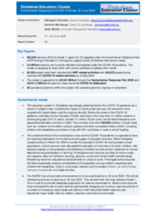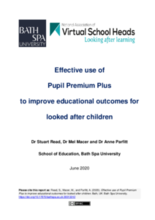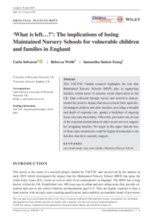Displaying 21 - 30 of 350
New analysis in this global report shows how COVID-19 may impact the funding of education, as well as the countries most at risk of falling behind.
This brief from the Zimbabwe Education Cluster presents details on the humanitarian needs and response in Zimbabwe due to the COVID-19 crisis, including the acute needs of orphans and vulnerable children, children with disabilities, and others.
This study explores the factors that are associated with positive educational outcomes for HYA with and without a foster care history.
Through the lens of institutional ethnography, this paper explores how experiences of education inside one Secure Children’s Home in England are shaped by the institution.
This article is a qualitative phenomenological study seeking to examine the perceptions, views and feelings of the orphans and vulnerable children (OVC), care-givers and community leaders on their experiences with Basic Education Assistance Module (BEAM) as a material and psychosocial support intervention in Zimbabwe.
This research project aimed to study and inform the effective use of Pupil Premium Plus (PP+)-funded interventions to support educational outcomes for looked after children in the UK.
This TACTYC funded research highlights the role that Maintained Nursery Schools (MNS) play in supporting families within areas of extreme social deprivation in the UK.
The author argues that early childhood education interventions for OVC should be a priority of government since quality education and care programs in the early years can enhance the possibility of breaking the cycle of inequity in the lives of OVC and positively contribute to the economy of the country.
This article provides a conceptual depiction of how schools and treatment foster parents partnerships can be formed and maintained.
This paper develops understandings of how being publicly identified and consequently labelled as ‘looked after’ can have damaging consequences for young people, particularly in how they are perceived by their peers in the context of schooling.




